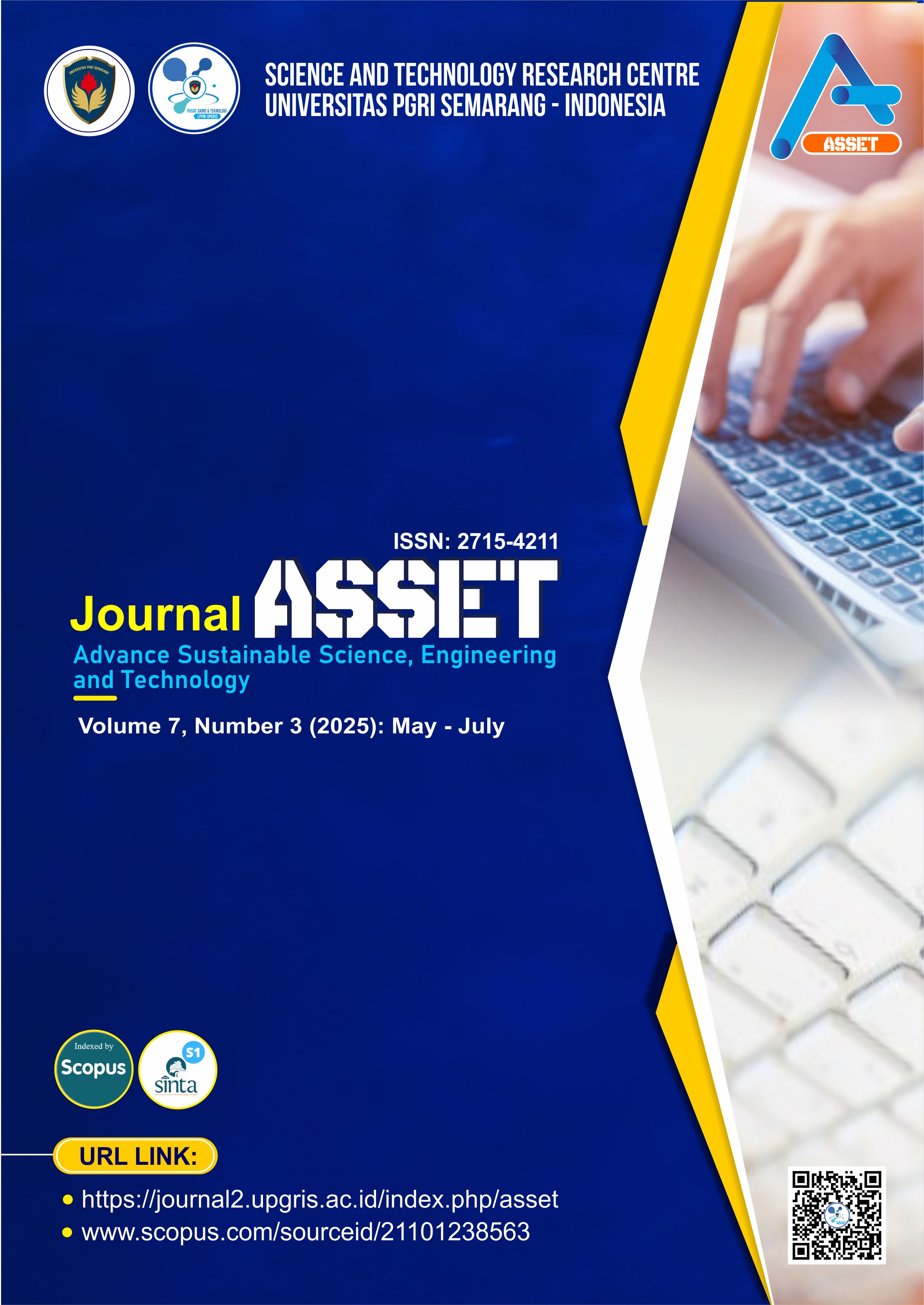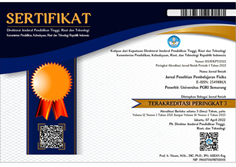Determinants of MSME Sustainability: A Regression-Based Study in Labuhanbatu
DOI:
https://doi.org/10.26877/asset.v7i4.2180Keywords:
MSME Resilience, Regression Analysis, Entrepreneurship Development, Small Business Sustainability, Entrepreneurial AutonomyAbstract
This study aims to identify factors that influence the development of healthy and independent MSMEs in Labuhanbatu Regency, Indonesia. The research method uses a quantitative approach with primary data collection through interviews and questionnaires distributed to 342 MSME actors in Labuhanbatu Regency. The sample was taken using a stratified random sampling technique based on the 2019 MSME population. The data were analyzed using multiple regression techniques to test the effect of the independent variables partially and simultaneously on the dependent variable. The results showed that education and skills (β = 25.299, p < 0.01), locus of control (β = 4.452, p < 0.01), government support and policies (β = 18.001, p < 0.01), and access to capital and financial resources (β = 9.332, p < 0.01) have a positive and significant influence on the development of healthy and independent MSMEs. In contrast, financial literacy (β = 1.025, p > 0.1), partnership networks (β = 1.005, p > 0.1), and infrastructure and technology (β = 1.087, p > 0.1) did not contribute significantly in this study. These findings emphasize the need for human resource capacity building and government policies that support access to capital as key strategies to encourage the sustainability and self-reliance of MSMEs in the region.
References
[1] Akhmad A, Khalid I, Asdar A. Strategy for Development of Micro, Small and Medium Enterprises in Gowa Regency, Indonesia. Eur J Dev Stud, 2023;3(5):7-15.
[2] Zhang T, Yang R, Yang Y, et al. Assessing the urban eco-environmental quality by the remote-sensing ecological index: Application to Tianjin, North China. ISPRS Int J Geo-Information, 2021;10(7):475. doi: 10.3390/ijgi10070475.
[3] Lambert E, Deyganto KO. Determinants of micro, small and medium enterprises (MSMEs) sustainable development in Africa. Qelos, 2023.
[4] Coad A, Srhoj S. Entrepreneurial ecosystems and regional persistence of high growth firms: A ‘broken clock’critique. Res Policy, 2023;52(6):104762. doi: 10.1016/j.respol.2023.104762.
[5] Lin JY, Yang Z, Li Y, et al. Development strategy and the MSMEs finance gap. J Gov Econ, 2022;5:100034.
[6] Achmad GN, Harahap V, Adnan M, et al. Government support, eco-regulation and eco-innovation adoption in SMEs: The mediating role of eco-environmental. J Open Innov Technol Mark Complex, 2023;9(4):100158. doi: 10.1016/j.joitmc.2023.100158.
[7] Rajamani K, Jan NA, Subramani AK, et al. Access to finance: challenges faced by micro, small, and medium enterprises in India. Eng Econ, 2022;33(1):73-85. doi: 10.5755/j01.ee.33.1.27998.
[8] Agasty S, Tarannum F, Narula SA. Sustainability innovation index for micro, small and medium enterprises and their support ecosystems based on an empirical study in India. J Clean Prod, 2023;415:137793. doi: 10.1016/j.jclepro.2023.137793.
[9] Yanurida D, Istania R, Asropi A. Factors That Pose Challenges For MSMEs In Engaging With The Government Procurement Digital Marketplace. Int J Econ Dev Res, 2023;4(2):1098–2023.
[10] Vega-Gonzalo M, Gomez J, Christidis P. How has COVID-19 changed private car use in European urban areas? An analysis of the effect of socio-economic characteristics and mobility habits. Transp Res part A policy Pract, 2023;172:103679. doi: 10.1016/j.tra.2023.103679.
[11] Šostar M, Ristanović V. Assessment of influencing factors on consumer behavior using the AHP model. Sustainability, 2023;15(13):10341. doi: 10.3390/su151310341.
[12] Santoso TI, Indrajaya D. Penggunaan sem–pls dan aplikasi smartpls untuk dosen dan mahasiswa. J Pengabdi Masy Akad, 2023;2(2):97–104. doi: 10.54099/jpma.v2i2.630.
[13] Daruhadi G, Sopiati P. Pengumpulan data penelitian. J-CEKI J Cendekia Ilm, 2024;3(5):5423–43.
[14] Klassen AC, Creswell J, Plano Clark VL, et al. Best practices in mixed methods for quality of life research. Qual life Res, 2012;21:377–80.
[15] Schwartz SH. A proposal for measuring value orientations across nations. Quest Packag Eur Soc Surv, 2003;259(290):261.
[16] Noor NHM, Rashid IMA, Kamarolzaman N, et al. Marketing Orientation, Customer Orientation, Entrepreneurship Education and Women Entrepreneurship Sustainability in Small and Medium-Sized Enterprises (SMEs) in Malaysia. Inf Manag Bus Rev, 2023;15(4):299–305.
[17] Field AP. Is the meta-analysis of correlation coefficients accurate when population correlations vary? Psychol Methods, 2005;10(4):444.
[18] Wirga IW, Dewi NIK, Pasek IK, et al. The Effect of Entertainment, Interaction, Customization, Trendiness, and Ewom (Electronic Word Of Mouth) Againts Brand Image in The Digital Bussiness Study Program of Bali State Polytechnic. In: International Conference on Applied Science and Technology on Social Science 2022 (iCAST-SS 2022). Atlantis Press; 2022:35-42.
[19] Hair JF, Risher JJ, Sarstedt M, et al. When to use and how to report the results of PLS-SEM. Eur Bus Rev, 2019;31(1):2–24.
[20] Singh R, Chandrashekar D, Hillemane BSM, et al. Network cooperation and economic performance of SMEs: Direct and mediating impacts of innovation and internationalisation. J Bus Res, 2022;148:116–30. doi: 10.1016/j.jbusres.2022.04.032.
[21] Otto A, Losacker S, Hansmeier H. Relatedness, complexity, and regional development paths in Germany: a sequencing approach. Ann Reg Sci, 2025;74(2):50.
[22] Xie P, Fu K. Financial literacy and digital product consumption-An analysis based on CFPS data. Financ Res Lett, 2024;68:105977. doi: 10.1016/j.frl.2024.105977.
[23] Junarsin E, Pelawi RY, Kristanto J, et al. Does fintech lending expansion disturb financial system stability? Evidence from Indonesia. Heliyon, 2023;9(9).
[24] Adam IO, Alhassan MD. Social Media and E-Commerce at the Global Level: Do ICT Access and ICT Skills Matter? Int J E-bus Res, 2021;17(4):1–18.
[25] Asaari M. Pengaruh Financial Knowledge dan Internal Locus of Control Terhadap Personal Financial Management Behaviour Pelaku UMKM Di Kabupaten Bogor. Innov J Soc Sci Res, 2024;4(2):2943–56.
[26] Anisah A, Salma D, Alwi MJ, et al. Model Perilaku Pengelolaan Keuangan Berbasis Pengetahuan Keuangan dan Sikap Keuangan pada UMKM di Bumi Raya, Morowali. J Samudra Ekon dan Bisnis, 2025;16(1):162–74.
[27] Peng H, Walid L. The effects of entrepreneurs’ perceived risks and perceived barriers on sustainable entrepreneurship in Algeria’s SMEs: The mediating role of government support. Sustainability, 2022;14(17):11067.
[28] Ahmad NH, Rahman SA, Rajendran NLKA, et al. Sustainable entrepreneurship practices in Malaysian manufacturing SMEs: the role of individual, organisational and institutional factors. World Rev Entrep Manag Sustain Dev, 2020;16(2):153–71. doi: 10.1504/WREMSD.2020.105986.
[29] De la Torre-Castro M, Lindström L. Fishing institutions: Addressing regulative, normative and cultural-cognitive elements to enhance fisheries management. Mar Policy, 2010;34(1):77–84. doi: 10.1016/j.marpol.2009.04.012.
[30] De la Torre-Castro M. Governance for sustainability: Insights from marine resource use in a tropical setting in the Western Indian Ocean. Coast Manag, 2012;40(6):612–33.











